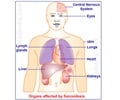Women suffering from chronic obstructive pulmonary disease (COPD) are more likely to suffer worse consequences than men, according to a new study that is due to be presented at the American Thoracic Society International Conference on May 22.
These differences may play a role in the increased death rate seen among female patients with COPD, said researcher Claudia Cote, M.D., Assistant Professor of Medicine at the University of South Florida in Tampa.The researchers studied 85 women, and compared them with 95 men who had the same levels of COPD severity according to guidelines of the Global Initiative for Chronic Lung Disease (GOLD). They found that female patients were significantly younger than male patients with the same severity of disease. The women had lower lung function, more trouble breathing, and reported a worse quality of life. The women also received a worse score on the BODE index, which looks at lung function, nutritional status, symptoms and exercise capacity in order to measure a COPD patient's disease severity and predicted survival.
COPD is the fourth leading cause of death in America, claiming the lives of 120,000 Americans in 2002. Beginning in 2000, women have exceeded men in the number of deaths attributable to COPD. In 2002, over 61,000 females died compared with 59,000 males.
Reasons that women with COPD do worse than their male counterparts, Dr. Cote said, may be related to underdiagnosis, misdiagnosis and less access to healthcare.
While the study findings may appear discouraging for women with COPD, the way in which the patients were assessed can lead to improvements in treatment for all COPD patients, Dr. Cote said.
"Until recently, doctors have used only lung function as a measurement for COPD severity," Dr. Cote said. "But we've come a long way in understanding this disease, and we now know that while COPD affects the respiratory system, it also has tremendous consequences on the peripheral muscles, cardiovascular system, and overall nutritional status--it's a multi-systemic disease. If we only measure respiratory function we will be overlooking other organ impairment and then will miss an opportunity for intervention."
Advertisement
For example, she said, there are now two long-acting bronchodilators that have been shown to improve not only lung function but also exercise capacity, symptoms, health status and lung hyperinflation in COPD patients. Non-drug interventions such as pulmonary rehabilitation can also improve some of these outcomes and improve survival, while surgery such as lung volume reduction and lung transplantation greatly help selected patients while prolonging their lives. "We should see COPD as a treatable disease and be aggressive in the management of our patients.
Advertisement
This message is important for women in particular, Dr. Cote said. "Women's life expectancy is on average seven years longer than men's, so women who are living with a chronic illness like COPD will bear a heavier burden of disease compared with men."
There is a growing awareness that COPD is treatable, and that there are tools to assess how patients are doing on many levels, Dr. Cote said. "Physicians will start treating COPD more aggressively, because they know they can provide important improvements in outcomes for their patients."
Source: Eurekalert









